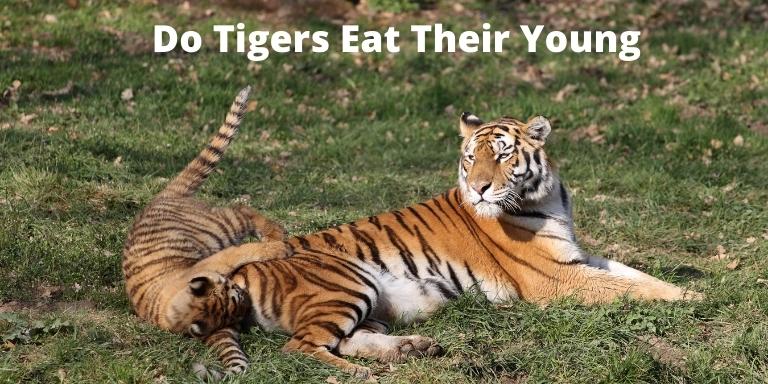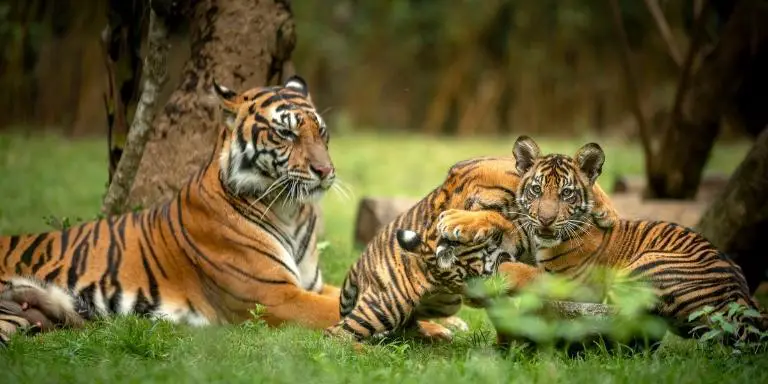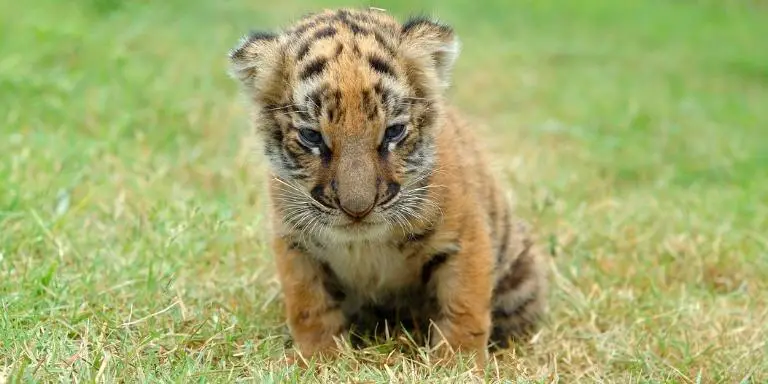Tigers are apex predators. They hunt to kill. Their hunger is massive, and they have muscled bodies trained by nature. However, do tigers eat their young?
Tigers eat their young. This irregular act results from many reasons, for example, if the cub is too weak, if the cub is born deformed, or if the tiger thinks of the cub as a competitor, etc.
Sounds awful? That is because it is.

The Life Cycle of a Tiger
Tiger’s life cycle circulates around its mother. Because the father isn’t seen near the cub but only occasionally. Tigers are not good fathers. Some of them don’t even look at their cubs properly.

The cubs are fed and given protection by the mother. The father tiger is occasionally seen around the family. When it wants to mate with the mother tiger. They don’t care for their young ones. Many of them view the cubs as food.
However, the tigresses are excellent mothers and will give their everything to rear the children. She gives them protection from other male tigers and provides cubs with food. Her whole life becomes a challenge after she becomes a mother.
Why Do Tigers Eat Their Young?
The tigers might kill and eat their young for several reasons. Eight reasons why the tigers eat their young are as follows,

1. Unhealthy cubs
If the female understands that the cub is weak and unhealthy, she decides to eliminate it. The wild is no playground, even for the tigers. The weak can never survive there. The mother tiger doesn’t want to see her babies struggling to fit in the predator group that hunts the more vulnerable jungle animals.
Hence the mother would kill her cub. It also allows her to focus more on the other cubs. She has no time for the weak cub as that extra effort can bring up the other ones much more.
2. The inability to be perfect tigers
The mother tigers have a keen sense. We can call it a sixth sense of knowing how the baby will turn out. If she somehow realizes that the baby wouldn’t be able to be a competition with the predator group, she wastes no more time and kills the cub.
The food pyramid is always narrower at the top. Hence there are never enough tigers that can fit in it. Only the fittest can survive in the wild.
This also allows them to eradicate any future competition. The weaker cubs wouldn’t grow into strong tigers and are considered to be a nuisance.
It might seem cruel, but that’s how nature is. We can’t control it. We can only witness it and be a part.
3. Deformed cub
If the tigress gives birth to a deformed cub, she kills it. The reason is the same as why she kills unhealthy cubs.
She doesn’t have time to waste on the deformed ones. She is not playfully roaming around in the wild. Instead, she needs to maintain a lot of safety measures.
Often the mother tiger is seen to change her dens along with the babies. She does this to save the babies from other ferocious males. She can’t always be around the babies to protect them.
She needs to hunt for food as the new members need proper nutrition to grow up. As a result, she changes her den from time to time so that the males can’t find out their location. Reasons like these tell her not to waste time and energy elsewhere.
4. Mistakenly
Sometimes the father mistakenly kills one of the offspring, thinking it belongs to someone else. That can result in the grief of the mother that can go on for days.
The mother is extremely affectionate to her offspring and cries out her heart to let the world know that cruel nature has murdered her dear child.
5. Mating purposes
The mother tiger would kill the children if only a single baby was born. This is because she wouldn’t be available for mating if the cub is with her. On the other hand, if she kills it now, she can mate again and have more offspring during the subsequent pregnancy.
That is why the single cub dies right after seeing the sunlight. Nature is cruel at times. That can’t be changed.
6. Excessive hunger
Tigers roam alone. They are not afraid of anything. They will hunt when they are hungry. Nothing can stop them. They have excessive hunger.
During the dry season, food and water are scarce everywhere. Like many other mammals in the wild, the tigers also kill and feed on their young ones.
The tiger loses its senses if it is excessively hungry. It then loses its motherly instincts and attacks its own children, thinking them to be someone else’s.
Moreover, if the mother doesn’t attack the babies, they will die out of hunger. Finally, the babies would be erased from the earth, too, as they can’t hunt and care for themselves in the wild.
7. Maternal behavior
The tigers have keen senses and abilities. However, they often lose their senses, and predatory instincts might kick in. This can be triggered by many things, such as trauma, excessive hunger, mistakenly doing something aggressive, etc. Then the maternal senses would completely evaporate, and the mother would kill her child ruthlessly.
8. To eradicate competition
The tiger life cycle is theatrical. Their young ones become their competitors, just like a royal family.
There are many cases where a veteran tiger was seen to hold his territory for over a decade, but in the end, it lost its den to its grandchild. This is because the grandchild grew up to be stronger and more competitive.
Hence, they tend to kill the cub before it can turn out to be a threat. This removes their competition and allows them to hold on to their territory longer.
Are Tigers Really Bad Fathers?
Adult male tigers are known to be inconsiderate to their cubs. Some of them never even look at the offspring properly. Other males wouldn’t hesitate to kill them. They are said to view the baby only as food.
However, nature often produces unimaginable things. One is that a male tiger was rearing its children when the mother died. This extraordinary event occurred in the Ranthambore tiger reserve in India in 2011.
Nature always has its tricks up its sleeves. We can never see what’s coming next.
Conclusion
If there were a test for determining how good a parent is, the tigers would probably miserably fail it. However, it is not their fault. It is just how nature is. Thus, asking why tigers eat their young can get you nowhere in the end as you can’t solve it.
This ferocity is in their genes. Still, the tigers, don’t matter male or female, would try their heart and soul to protect and nurture the living or surviving cubs. They are even seen to grieve at the loss of one.
You might also be interested in:
